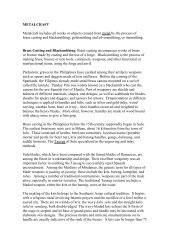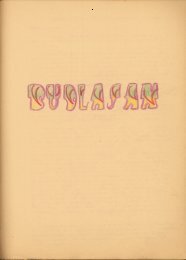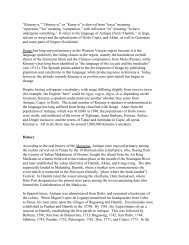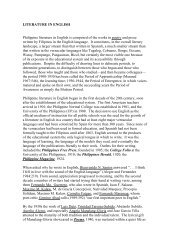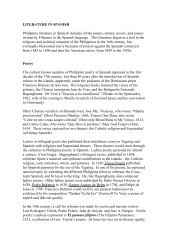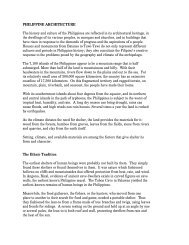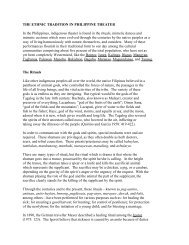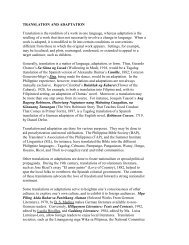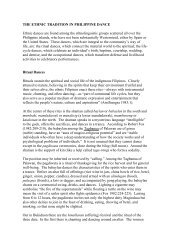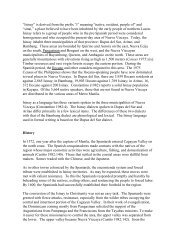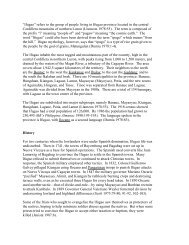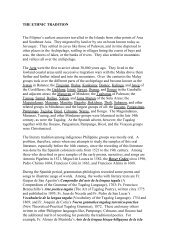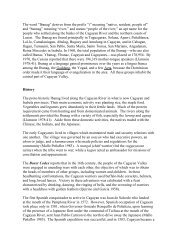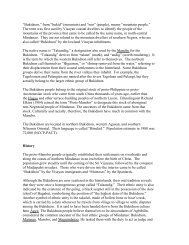The Tboli, also known as T'boli, Tiboli, and Tagabili, are an old ...
The Tboli, also known as T'boli, Tiboli, and Tagabili, are an old ...
The Tboli, also known as T'boli, Tiboli, and Tagabili, are an old ...
Create successful ePaper yourself
Turn your PDF publications into a flip-book with our unique Google optimized e-Paper software.
son, is given a cohort of fire, a tok (sword), <strong><strong>an</strong>d</strong> shield. Cumucul is married to Boi<br />
Kabil. Sfedat, the second son, is married to the second daughter, Bong Libun. This<br />
marriage produces no progeny, leading to Sfedat’s despondency. One day, he <strong>as</strong>ks<br />
his wife to kill him. His corpse becomes l<strong><strong>an</strong>d</strong> from which sprout all kinds of pl<strong>an</strong>ts<br />
<strong><strong>an</strong>d</strong> trees. Dwata, the third son, is married to two of his sisters, Sedek We <strong><strong>an</strong>d</strong> Hyu<br />
We. His request for one of the powers gr<strong>an</strong>ted to Cumucul is refused. Thus, he<br />
leaves the sky with his wives <strong><strong>an</strong>d</strong> seven children from Hyu We: Litik, the god of<br />
thunder; Bl<strong>an</strong>ga, the god of stones <strong><strong>an</strong>d</strong> rocks; Teme Lus, the god of wild be<strong>as</strong>ts;<br />
Tdolok, the god of death; Ginton, the god of metallurgy; Lmugot M<strong>an</strong>gay, the god of<br />
life <strong><strong>an</strong>d</strong> of all growing things; <strong><strong>an</strong>d</strong> Fun Bulol, the god of the mountains; <strong><strong>an</strong>d</strong> six from<br />
Sedek We. For a place to stay, he <strong>as</strong>ks Bong Libun for the l<strong><strong>an</strong>d</strong> that w<strong>as</strong> once<br />
Sfedat’s body. Bong Libun agrees on the condition that she marry one of his sons.<br />
Dwata spreads the l<strong><strong>an</strong>d</strong>, <strong><strong>an</strong>d</strong> pl<strong>an</strong>ts the trees <strong><strong>an</strong>d</strong> other vegetation; the result is the<br />
earth.<br />
<strong>The</strong> first people <strong>are</strong> created after Dwata breathes life into the day figurines made by<br />
Hyu We <strong><strong>an</strong>d</strong> Sedek We. When Dwata does not fulfill his side of the bargain with<br />
Bong Libun, because his sons will not have her <strong>as</strong> wife, Bong Libun marries her<br />
youngest brother Datu Bnoling. With him she h<strong>as</strong> seven sons, who become scourges<br />
of the earth: Fun Knkel, god of fever; Fun D<strong>as</strong>kulo, god of head dise<strong>as</strong>es; Fun Lkef,<br />
god of c<strong>old</strong>s; Fun Kumuga, god of eye afflictions; Fun Blekes, god of skin dise<strong>as</strong>e; <strong><strong>an</strong>d</strong><br />
Fun Lal<strong>an</strong>g, god of baldness. To alleviate the damage done by these scourges, the<br />
divine couple Loos Klag<strong>an</strong> <strong><strong>an</strong>d</strong> La Fun <strong>as</strong>sume the role of healers.<br />
One of the most influential figures in the <strong>Tboli</strong> p<strong>an</strong>theon is the muhen, a bird<br />
considered the god of fate, whose song when heard is thought to presage misfortune.<br />
Any undertaking is immediately ab<strong><strong>an</strong>d</strong>oned or postponed when one hears the muhen<br />
sing.<br />
<strong>The</strong> <strong>Tboli</strong> <strong>also</strong> believe in busao (malevolent spirits) which wreak havoc on the lives of<br />
hum<strong>an</strong> beings, thus causing misfortune <strong><strong>an</strong>d</strong> illness. Desu or propitiatory offerings of<br />
onuk bukay (white chicken) or sedu (pig) <strong>are</strong> made to placate or gain favors from these<br />
evil spirits. <strong>Tboli</strong> rites <strong>are</strong> normally presided over by a morally upright elder who is<br />
proficient in <strong>Tboli</strong> tradition. Often enough, the datu themselves preside.<br />
To the <strong>Tboli</strong>, all objects house a spirit. <strong>The</strong>y continually strive to gain the good<br />
graces of these spirits by offering them little gifts. Before crossing a river, for example,<br />
they may throw a ring. If spirits or gods need to be appe<strong>as</strong>ed, the <strong>Tboli</strong> make desu or<br />
offerings which may consist of cooked food, the agong, <strong><strong>an</strong>d</strong> the kafil<strong>an</strong>.<br />
<strong>The</strong> <strong>Tboli</strong> afterlife h<strong>as</strong> several destinations. Murder victims <strong><strong>an</strong>d</strong> warriors slain in battle<br />
go to a place called kayong, where everything is red. Entry into kayong is <strong>an</strong>nounced<br />
by the sound of agong, hagalong, klint<strong>an</strong>g, <strong><strong>an</strong>d</strong> dwegey (violin). Thunder <strong><strong>an</strong>d</strong> lightning<br />
during a burial signify a spirit’s entry into kayong. Suicides go to kumawing, where<br />
everything sways <strong><strong>an</strong>d</strong> swings. Victims of drowning become citizens of the sea. Those<br />
who die of <strong>an</strong> illness go to Mogol, where day is night <strong><strong>an</strong>d</strong> night is day.



